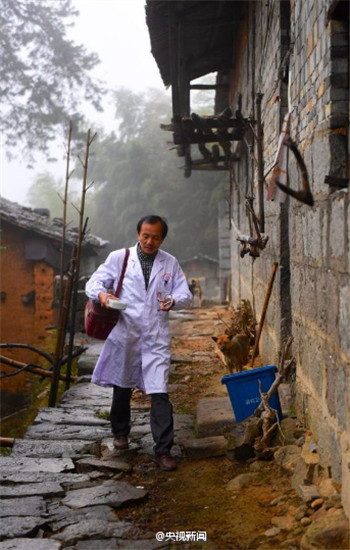
Li Qinru is on his way to a patient's home. (Photo/CCTV)
In an age when money defines everything, a doctor gave up the chance to earn big and instead chose to stay in his rural hometown and help the elderly, reported Xinhua News Agency.
Li Qinru, 54, is the only doctor in Zaoshi village in Qiqin township, Jiangxi province. Zaoshi is the most remote administrative village in the county. With an altitude of 600 meters, the only concrete road leading to the outside world was built in 2012, and the 13 communities in the village are all located halfway up the mountain, with the remotest one six kilometers away from Li's clinic.
Young people have left the village to work in cities, leaving behind the elderly with the average age of more than 70.
It is cold and humid in late October. Li Qinru is eating breakfast when the phone rings. It is an old woman named Li Dianpo. A person making the call on her behalf said that her husband had an asthma attack, and she herself wasn't feeling well.
Putting down his bowl, Li steps out of his clinic with a medical kit full of medicines, a blood pressure monitor and a stethoscope.
Carefully walking through the slippery stones, Li enters the patient's home. He inquires about the conditions of Li Dianpo's husband, prepares the medicines, and hangs up the saline drip for him. He also prescribes medicines for the old woman.
"The couple is in their 80s. One suffers from arthritis and asthma, and the other has hypertension. Their sons are working in the county seat. They old couple come to me when they are unwell," said Li.
While Li was seeing his patients, several others gathered at the door for consulation.
By the time he finished handling all the patients, it was half past eleven. Then it was time go back to the clinic. On the way back, he was stopped by an old man who was walking with difficulty. He whispered something to Li.
"He has used up the firewood and asked me to chop some for him," said the doctor.
A patient named Deng Xiang told a Xinhua reporter that "whether it is chopping firewood or buying salt and meat, we ask doctor Li for help. He is better than our sons."
By the end of 2010, China had 1.2 million rural doctors like Li Qinru. On average, two doctors serve for an administrative village. Some of them work in remote and underdeveloped areas where residents find it hard to see a doctor in larger hospitals in towns. For them, rural doctors like Li Qinru are the only resort.
Since he became a doctor at 17, Li has worn out more than 200 pair of shoes and covered more than 100,000 kilometers on the trips to his patients' homes.
Walking mountainous road for years has left Li with severe rheumatic arthritis. It tortures him when it gets cold.
His wife complains about Li's job often.
"I told him to quit the job, but he never listens to me," said Peng Xiaomei, his wife. She said many fellow rural doctors have left home and made decent income in towns. Li is the only one who has stayed behind.
For each home visit, Li charges 8 yuan. Sometime, he simply provides free services when the patients cannot afford the treatment.
Li said it is not realistic for the old people to go more than 10 km to hospitals in towns. As a doctor, he cannot abandon them.
But he is worried about the future of his patients.
"My health is getting worse and worse. I have been looking for my successor for years. But I haven't found one," said Li.
To solve the problem, Ji'an city, which administers Qiqin township, has launched a program to cultivate rural doctors with preferential policies of "zero tuition plus 300 yuan in subsidy" for students. However, no one from Qiqin township applied for it.
Li Qinru is looking to other solutions.
"Zaoshi is a high-land village with rich tourism resources such as distinctive folklore culture, delicacies, rare stones and azalea blossoms," said Li. If the tourism develops well, villagers can make a better life, which may help solve the problem.


















































